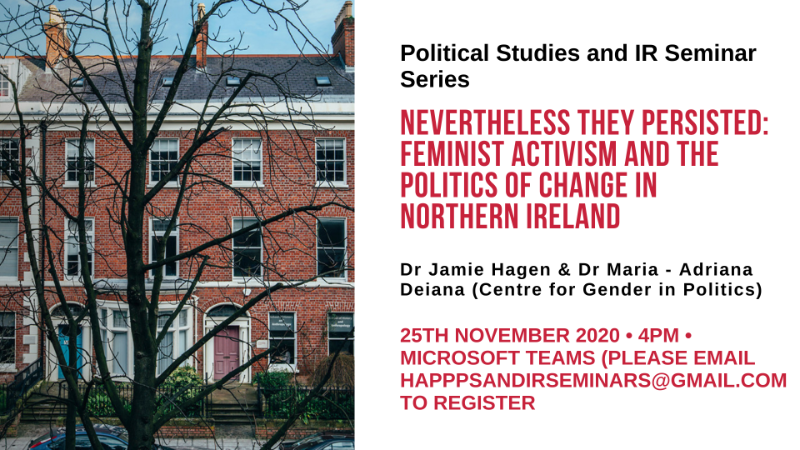Dr Maria-Adriana Deiana and Dr Jamie Hagen, HAPP, “Nevertheless, they persisted. Feminist activism and the politics of crisis in Northern Ireland.”
- Date(s)
- November 25, 2020
- Location
- Online via MS Teams
- Time
- 16:00 - 17:00
- Price
- Free
“Nevertheless, they persisted. Feminist activism and the politics of crisis in Northern Ireland.”
Authors: Maria-Adriana Deiana, Queen’s University Belfast
Jamie J. Hagen, Queen’s University Belfast
Danielle Roberts, Ulster University
During political and economic crises gender equality concerns and the experiences of women and LGBT+ folks tend to be marginalised in favour of other political issues deemed of more urgency. At the same time, the logic of crisis works to obscure or accelerate ongoing processes that undermine the social, sexual, cultural and economic situations of diversely positioned women and LGBT+ individuals.
In Northern Ireland, we have seen these dynamics at play numerous times, from the 20thanniversary of the Good Friday agreement to the longstanding crisis of devolved political institutions and in the context of Brexit (Pierson 2016, Deiana 2016, Gilmartin, 2019, Galligan, 2019) and the challenges presented by current global pandemic. In spite of these dynamics, women’s groups, feminist and LGBT+ activists, as well as progressive politicians, have continued to organise collectively to keep concerns and claims about gender+ equality and social justice onto the political agenda and public debate.
Mobilising feminist scholarship on the politics of crisis (Ahrens et al. 2018; Kantola and Lombardo 2017) and recent feminist analyses of Brexit(Dustin, Ferreira, and Millns 2019; Guerrina and Masselot 2018; Hozić and True 2017), this paper interrogates how feminist/LGBT+ grassroots activists in NI responded to ongoing challenges for gender equality, social justice and inclusion. Drawing upon in-depth interviews, the paper reflects on the politics of coalition-building and strategic feminist activism in response to the intersection between the breakdown of devolved institutions, the uncertainty over Brexit and the ongoing gendered challenges exacerbated by the Covid-19 emergency. By foregrounding the contextual complexities of Northern Ireland’s post-GFA politics, the paper contributes to critical feminist engagements with the politics of global contemporary crises, interrogating explicit and unanticipated effects.
Wednesday 25 November 2020, 4pm via MS Teams
Register by email happpsandirseminars@gmail.com
Dr Maria-Adriana Deiana is a lecturer in International Relations and Co-Director of the Centre for Gender in Politics at HAPP. Her research deploys feminist and other critical IR perspectives to examine the interrelated issues of war, peace, security and borders. She has authored papers on gender politics, citizenship and feminist activism, as well as on the relationship between cinema, borders and affect in contexts shaped by conflict/international intervention. Her work has been published in peer reviewed journals, such as Citizenship Studies (2016) , Geopolitics (2019)and Critical Studies on Security (2020), edited book collection (Palgrave) and other media (Open Democracy 50:50). Her monograph titled 'Gender and Citizenship: Promises of Peace in Post-Dayton Bosnia & Herzegovina' was published by Palgrave in 2018.
Dr Jamie Hagen is a lecturer in International Relations and Co-Director of the Centre for Gender in Politics at HAPP. Dr Hagen's research is at the intersection of gender, security studies and queer theory. She researches LGBTQ inclusion in Women, Peace and Security practices as well as queer analysis of security studies more broadly. Her work at the intersection of gender analysis, security studies and LGBTQ communities has appeared in a number of peer- reviewed journals including International Affairs (2016) and Critical Studies on Security (2017), edited book collections and the working paper series of the Centre for Women, Peace and Security at the London School of Economics.
| happpsandirseminars@gmail.com | |
| Website | https://www.qub.ac.uk/schools/happ/ |

